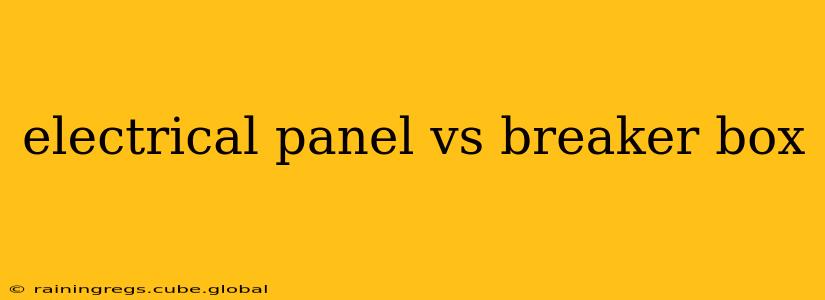The terms "electrical panel" and "breaker box" are often used interchangeably, leading to confusion. While they essentially refer to the same device, understanding the nuances can be helpful for homeowners and DIY enthusiasts. This article will clarify the distinctions, address common questions, and provide valuable insights into the vital role these components play in your home's electrical system.
What is an Electrical Panel?
An electrical panel, also known as a load center, is the central distribution point for electricity in your home. It receives power from the utility company's power lines through a meter and safely distributes it to various circuits throughout your house. Think of it as the heart of your home's electrical system, controlling the flow of power to your lights, appliances, and outlets. Inside, you'll find circuit breakers—the safety devices that protect your wiring from overloads and short circuits.
What is a Breaker Box?
The term "breaker box" is a more colloquial term often used to describe the same device: the electrical panel. It directly refers to the box containing the circuit breakers, emphasizing the protective function of the device. Essentially, "breaker box" is a shorter, simpler way of saying "electrical panel."
Are Electrical Panels and Breaker Boxes the Same Thing?
Yes, for all practical purposes, an electrical panel and a breaker box are the same thing. The slight difference lies in the emphasis: "electrical panel" is a more formal and technical term, highlighting its function as the central distribution point, while "breaker box" emphasizes the protective role of the circuit breakers within it.
What are the main components of an electrical panel?
An electrical panel houses several key components working together to manage your home's electricity:
- Main Breaker: This is the primary switch controlling the entire electrical supply to the panel. It's crucial for safety, allowing you to cut power to the entire house.
- Circuit Breakers: Individual switches that protect specific circuits within your home. Each breaker controls a designated group of outlets, lights, or appliances. If a circuit overloads, the breaker will trip, cutting power to that circuit and preventing damage.
- Bus Bars: Metal bars that distribute electricity from the main breaker to the individual circuit breakers.
- Wiring: The electrical wiring connecting the panel to the various circuits throughout your home.
What are the different types of electrical panels?
Electrical panels come in various types, primarily categorized by their voltage and the type of circuit breakers they use:
- 120/240 Volt Panels: Standard panels found in most residential homes.
- Subpanels: Smaller panels that are fed power from a main panel, often used in larger homes or to serve specific areas like a detached garage.
- Fuse Panels: Older homes might have fuse panels instead of circuit breakers. While still functional, fuses are less convenient as they need replacement after tripping.
How often should I have my electrical panel inspected?
Regular inspections are crucial for safety and preventing electrical problems. While no fixed schedule exists, it's advisable to have a qualified electrician inspect your panel at least every few years, or more frequently if you notice any issues like flickering lights, frequent tripping breakers, or unusual smells near the panel.
What are the signs that I need a new electrical panel?
Several factors might indicate a need for a panel upgrade:
- Outdated panel: Older fuse boxes or panels may not meet modern safety standards.
- Frequent tripping breakers: Consistent tripping suggests overloading or potential wiring issues.
- Limited capacity: Adding more appliances or higher-power devices may overwhelm the panel's capacity.
- Visible damage: Any physical damage to the panel requires immediate attention.
Can I upgrade my electrical panel myself?
No. Electrical work is inherently dangerous and should only be performed by licensed and qualified electricians. Improper work can lead to electrical fires, electrocution, or other serious hazards. Always prioritize safety and seek professional help for any electrical panel work.
In conclusion, while the terms "electrical panel" and "breaker box" are often used interchangeably, understanding the subtle differences can enhance your understanding of your home's electrical system. Regular maintenance and professional inspections are vital to ensuring the safety and reliability of your electrical panel.
